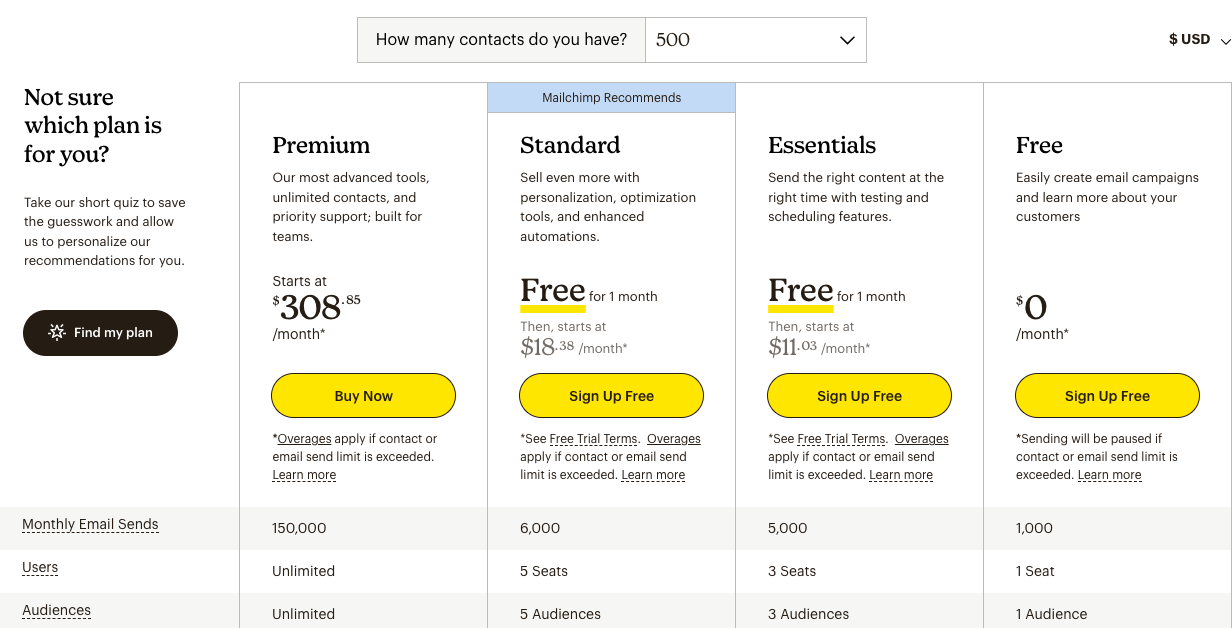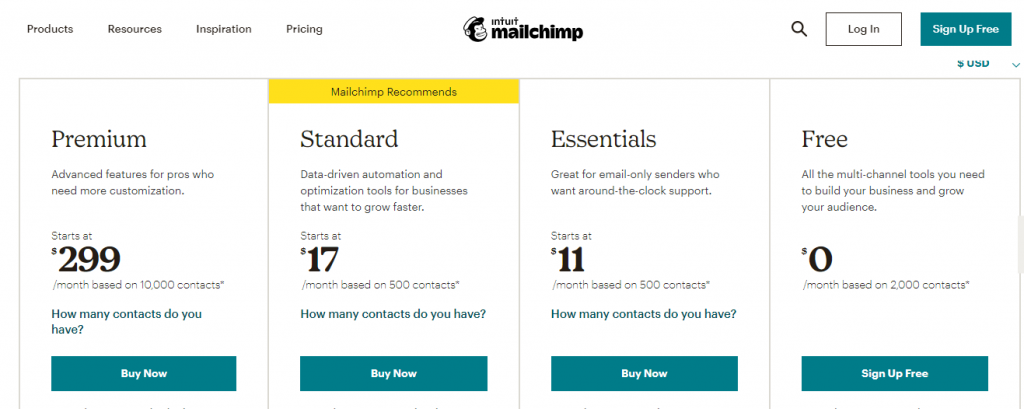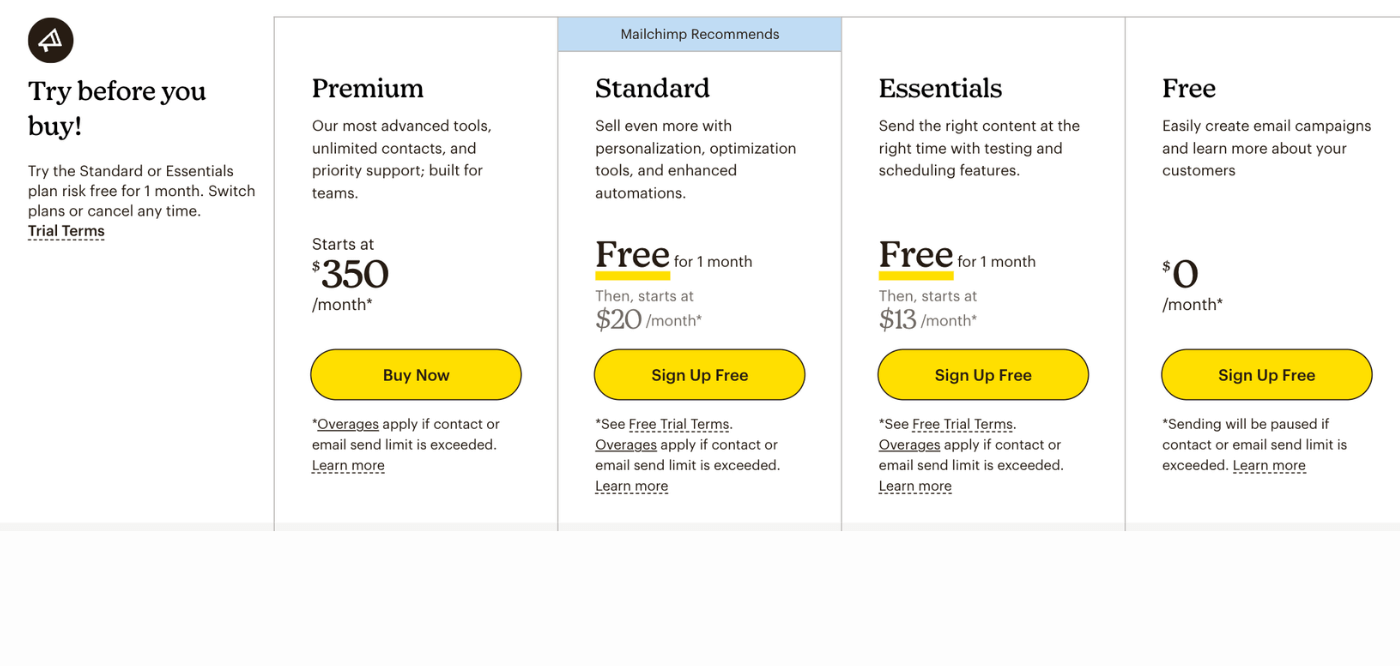So, you’re interested in understanding Mailchimp’s pricing structure, huh? It can seem a little complex at first, but don’t worry – we’re going to unpack it all in this article.
Mailchimp offers several plans, each with unique features depending on your needs and the size of your business. Their free plan is pretty good for a starter or a small business. But when your contact list starts to grow, you might want to consider upgrading to their Essentials, Standard, or Premium plan.
Remember the adage “You get what you pay for”? This certainly rings true with Mailchimp. The more you’re willing to invest, the more capabilities you gain access to. Insights, customization options, multi-user accounts, even advanced audience segmentation – each tier offers progressively more. It may seem a little confusing at first but think of it this way: Your pricing plan grows with your business.
And finally, here’s a heads up: Your plan cost can also shift based on the size of your audience. Larger audience equals a higher plan cost. It’s just something to keep in mind as your business expands. Stick around for this article where we dig deep into every aspect of Mailchimp’s pricing plans, so you’re sure to find the ideal plan for your needs!
Unpacking Mailchimp’s Pricing Structure
Overview of Mailchimp’s Pricing Structure
With the evolution of digital marketing strategies, finding an efficient and cost-effective email marketing tool is vital. One of the popular contenders is Mailchimp. Here, we will provide you a comprehensive understanding of Mailchimp’s pricing model.
Basics of Mailchimp’s Pricing Model
Mailchimp offers four different pricing plans: Free, Essentials, Standard, and Premium. Additionally, it provides a Pay As You Go option for businesses with inconsistent emailing schedules. The cost varies based on factors like the number of subscribers and specific features.
Factors affecting the price
The primary factor affecting pricing is the number of subscribers. As your subscriber list grows, so does the price. Other influences include access to advanced features like multivariate testing, comparative reports, or priority support.
Exploring Mailchimp’s Free Plan
The Free plan of Mailchimp is the first stepping stone for the newbie digital marketer.
Features available in the Free Plan
This plan grants important features like marketing CRM, forms & landing pages, creative assistant, and mobile app.
Limitations of the Free Plan
Some limitations can be found like limited access to email templates, inability to remove the Mailchimp logo from emails, and absence of audience segmentation.
Ideal users for the Free Plan
The Free Plan is perfect for small businesses, startups, or freelance marketers on a budget and still wanting to explore email marketing strategies.

This image is property of www.sendx.io.
Detailing Mailchimp’s Essentials Plan
The Essentials Plan serves as the next level up, offering more perks than the Free Plan.
Monthly cost and features of Essentials Plan
For $9.99 per month, you get access to all email templates, custom branding, and A/B testing.
Comparing Essentials Plan with Free Plan
Unlike the Free Plan, the Essentials Plan allows businesses to utilize custom branding and offers A/B testing for targeted marketing.
Best-suited users groups for Essentials Plan
The Essentials Plan is best-suited for growing businesses that require more advanced tools and larger email sends.
Examining Mailchimp’s Standard Plan
The Standard Plan is an upgrade from the Essentials Plan, designed for businesses (SMBs) with a wider audience.
Inclusions in the Standard Plan
For $14.99 per month, you can unlock advanced features like behavioral targeting, custom templates, dynamic content, and event-based automation series.
How Standard Plan outperforms Essentials Plan
Apart from the features of Essentials, the Standard Plan provides extensive automation options and advanced analysis methods.
Target audience for Standard Plan
This plan is catered to medium-sized businesses targeting a larger audience and requiring deeper audience insights.

This image is property of www.smtpservers.co.
Understanding Mailchimp’s Premium Plan
The Premium Plan is the ultimate selection of Mailchimp’s pricing plans, meant for large businesses with extensive requirements.
Premium Plan pricing and extra features
At $299 per month, the Premium Plan provides advanced segmentation, multivariate testing, unlimited seats and role-based access, and phone support.
Comparison of Premium Plan with other plans
While the cost is significantly higher, the Premium Plan offers comprehensive features and support, making it the best value for large-scale operations.
Who should opt for the Premium Plan
Large businesses or enterprises with extensive marketing requirements and budget to match should consider this plan.
Mailchimp’s Pay As You Go Option
This pricing plan is a unique and flexible feature of Mailchimp’s structure.
How the Pay As You Go Plan works
You purchase email credits and use them when needed, great for businesses with infrequent email campaigns.
Differences between regular plans and Pay As You Go
Unlike regular plans, the Pay As You Go option doesn’t incur monthly fees. Instead, you buy credits that roll over until you use them.
Specific instances when Pay As You Go may be suitable
This plan shines for seasonal businesses or small projects with infrequent email schedules.

This image is property of s3.us-east-2.amazonaws.com.
Additional Costs to Consider in Mailchimp
Understand potential additional costs to ensure you’re making the most informed decision.
Charges for exceeding subscriber limits
Exceeding your subscriber limit results in additional charges. Ascending to the next pricing tier might be more cost-effective.
Price increments for extra features
Special analytics tools, testing options, or support services may come with additional fees.
Hidden costs in Mailchimp’s plans
Check terms and conditions to ensure any unforeseen costs don’t ambush you.
Discounts and Savings in Mailchimp’s Pricing
Mailchimp offers ways to save some dollars, too.
How to qualify for Mailchimp’s discounts
You can avail of a 10% security discount by implementing two-factor authentication to your account, and a 15% discount for non-profit and charitable organizations.
Available types of discounts and savings
Mailchimp also offers pre-pay plans that can score you discounts, allowing you to pay upfront for 3-12 months.
Impact of discounts on overall pricing
These discounts can significantly affect your overall expenses, especially for long-term users.

This image is property of www.emailtooltester.com.
Navigating Pricing Changes in Mailchimp
Navigating pricing changes can be quite a task.
Understanding regular updates to Mailchimp’s pricing
Mailchimp revises their prices periodically, outlining essentials for staying up-to-date.
Factors leading to changes in Mailchimp’s plan prices
Updates in technology, inflation, or changes in marketing environment may lead to fluctuations.
Ways to adapt to these pricing changes
Monitoring changes and planning ahead will help you manage price increases devoid of interruptions to your operations.
Conclusion
Evaluating Mailchimp’s Pricing Structure
Mailchimp’s pricing structure offers various plans to suit different needs and budgets with the possibility of additional costs for extra features and exceeding subscriber limits.
Matching Mailchimp’s plans with your business needs
Selecting the right plan requires understanding your business’s size, needs, and the available budget. Therefore, always strive for a balance between cost-effectiveness and ensuring your marketing needs are comprehensively served.
In conclusion, Mailchimp provides flexible and comprehensive email marketing options with an adaptable pricing structure to meet every business requirement.